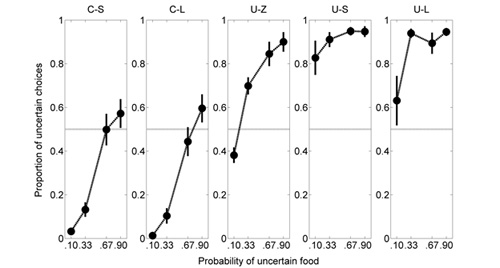Risky Choice Behavior
The outcome of a choice is not always certain. From scratch tickets to slot machines, and from financial investment to “playing” the stock market, individuals consistently face choices with unpredictable outcomes. We have been exploring the factors that contribute to risky decision making in rats. Specifically, we have been interested in the effects of global and local factors, as well as the parameters of different choice outcomes, on the propensity to make risky choices. Previous research in our lab has shown that the outcome of the previous choice interacts with the probability of risky reward to affect the next choice individuals make (Figure 1; Marshall & Kirkpatrick, 2013), and that rats seem to use the outcome they could have had for making a certain choice as their reference point for encoding risky gains and losses (Marshall & Kirkpatrick, 2015). Currently, we are exploring the effects of ambiguous outcomes on risky choice behavior, and how different reinforcement learning models can account for individual differences in risky choice.
| Figure 1. |
 |
Related Publications
Marshall, A. T., & Kirkpatrick, K. (2017). Reinforcement learning models of risky choice and the promotion of risk-taking by losses-disguised-as-wins in rats. Journal of Experimental Psychology: Animal Learning and Cognition, 43(3), 262-279.
Kirkpatrick, K., Marshall, A. T., & Smith, A. P. (2015). Mechanisms of individual differences in impulsive and risky choice. Comparative Cognition and Behavior Reviews, 10, 45-72.
Marshall, A. T., & Kirkpatrick, K. (2015). Relative gains, losses, and reference points in probabilistic choice in rats. PLoS ONE, 10, e0117697.
Marshall, A. T., & Kirkpatrick, K. (2013). The effects of the previous outcome on probabilistic choice in rats. Journal of Experimental Psychology: Animal Behavior Processes, 39, 24-38.
Related Conference Presentations
Marshall, A. T., Davis, C., & Kirkpatrick, K. (2016). Losses-disguised-as-wins and risky choice in rats: A reinforcement learning perspective. Eastern Psychological Association, New York, NY.
Kirkpatrick, K. (2015). Individual differences in impulsive and risky choice. Invited colloquium presented at the Center for Visual and Cognitive Neuroscience, North Dakota State University, Fargo, ND.
Kirkpatrick, K. (2014). Individual differences in impulsive and risky choice. Invited address presented at the Meeting on Addictions, Mexico City, MX.
Fardette, E., Marshall, A. T., & Kirkpatrick, K. (2014). The effects of certain outcome magnitude on probabilistic choice in rats. International Conference on Comparative Cognition, Melbourne, FL.
Marshall, A T., Hyder, J., & Kirkpatrick, K. (2013). Probabilistic choice in rats: the effects of differential losses and alternative outcomes. Fall Meeting of the International Conference on Comparative Cognition, Toronto, Canada.
Hyder, J., Marshall, A. T., & Kirkpatrick, K. (2013). The effects of relative gains and losses on probabilistic choice in rats. Annual Meeting of the Society for the Quantitative Analyses of Behavior, Minneapolis, MN.
Marshall, A. T. & Kirkpatrick, K. (2012). Reward magnitude effects on sequential risky choices in rats. International Conference on Comparative Cognition, New Orleans, LA.
Marshall, A. T. & Kirkpatrick, K. (2012). Modeling sequential choices in a risky choice task. Annual Meeting of the Society for the Quantitative Analyses of Behavior, Seattle, WA.
Marshall, A. T. & Kirkpatrick, K. (2012). Previous outcome effects on sequential probabilistic choice behavior. Oklahoma/Kansas Judgement and Decision Making Group Workshop, Manhattan, KS.
Marshall, A. T. & Kirkpatrick, K. (2011). Probabilistic choice in rats. International Conference on Comparative Cognition, Seattle, WA.
